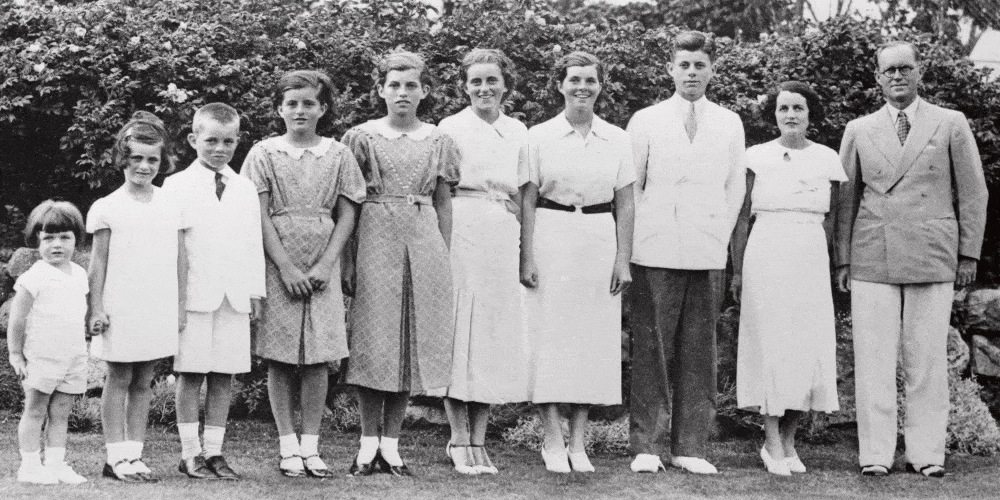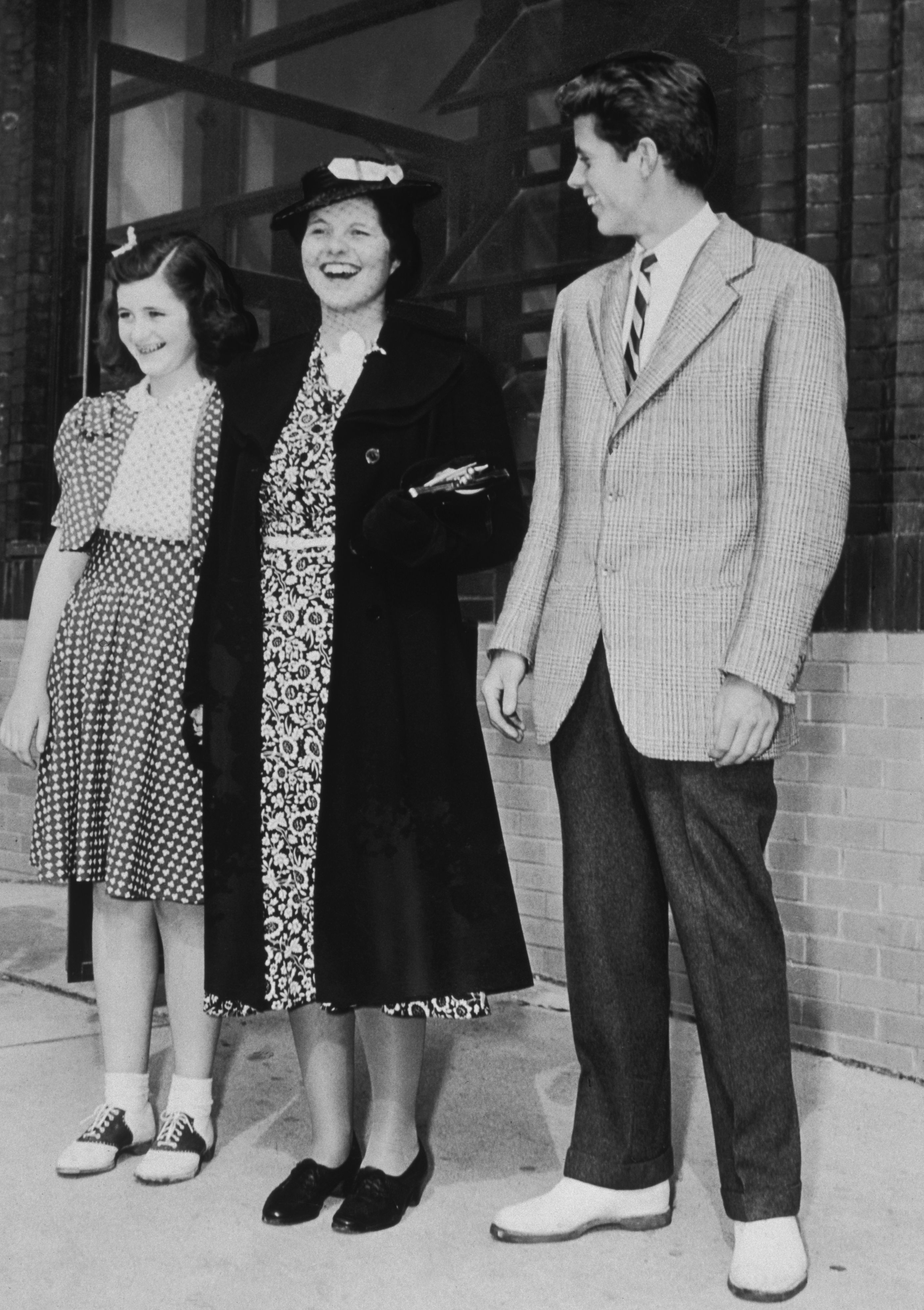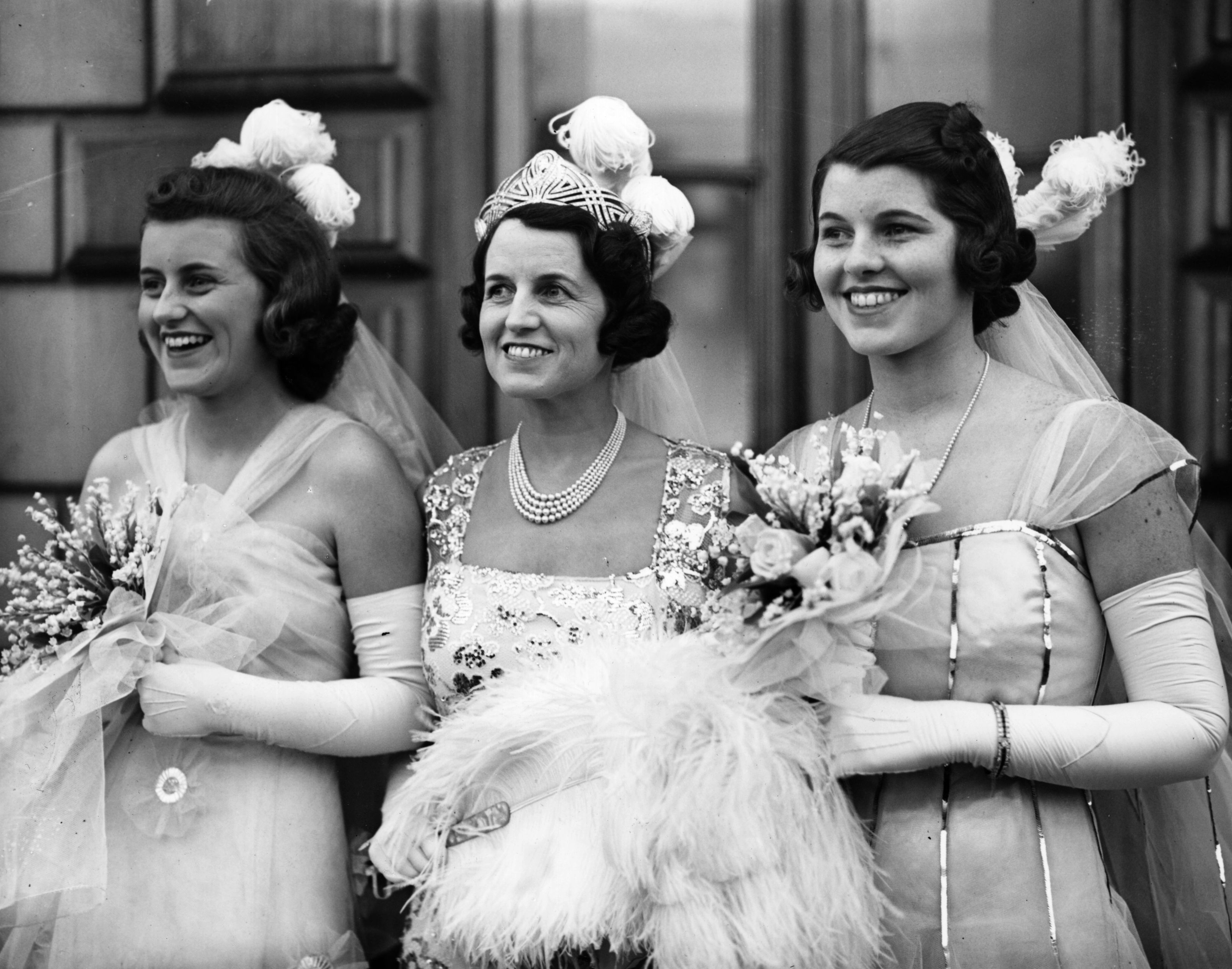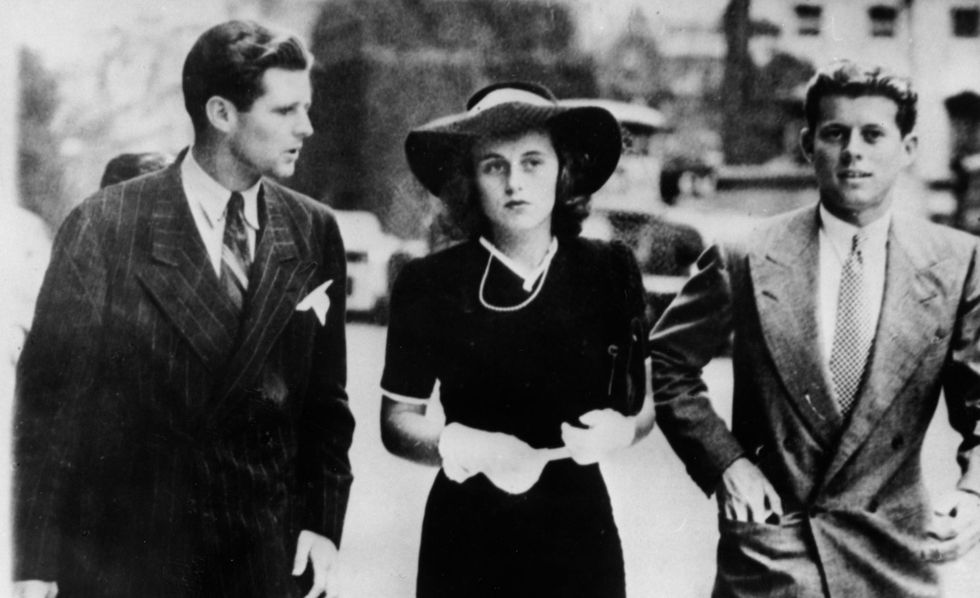The Secret Lobotomy of Rosemary Kennedy
JFK's younger sister was permanently disabled by a barbaric surgery in the 1940s. Now, her legacy is more important than ever.

On September 13, 1918, Rose Kennedy, wife of prominent businessman Joseph Kennedy Sr., went into labor with her third child. Rose's obstetrician was called to the Kennedys' home, but with a pneumonia epidemic raging through Boston, he failed to arrive before the baby entered the birth canal.
A nurse, desperate to stop the delivery until the doctor arrived, held Rose's legs closed. When that failed, she reached into Rose's birth canal and held the baby's head in place for an unbelievable two hours. In her book Rosemary: The Hidden Kennedy Daughter, Kate Clifford Larson writes, "It was well understood that preventing the movement of the baby through the birth canal could cause a lack of oxygen, exposing the baby to possible brain damage and physical disability."
When the baby finally arrived, she was named Rose Marie Kennedy, after her mother. Later nicknamed Rosemary, her life would be one of struggle, heartache, medical malpractice, and abandonment. But Rosemary Kennedy's legacy is not a story of tragedy—it's a story of quiet power that would eventually change the quality of life for disabled and mentally ill people across the country.

Rose Kennedy with her children (from left: Joseph Jr., JFK, Kathleen, Rosemary, and Eunice) in 1921.
Rose knew her daughter was different. By outside appearances, she was like any other Kennedy, with her father's easy smile and her mother's nest of dark hair. But she wasn't as active as her older brothers Joe Jr. and Jack. She struggled in school. Rosemary's disabilities soon became impossible to ignore, and years later, when trying to understand her daughter's issues, Rose sought the advice of physicians, who returned the diagnosis of "mental retardation," "genetic accident," and "uterine accident."

Rosemary (center), with sister Jean and brother Jack, circa 1940.
In the quickly expanding household of boisterous, competitive Kennedys, Rosemary was often left behind. She was held back in school, until finally Rose hired private tutors for Rosemary and kept her at home. Watching her brothers and sisters go out without her left Rosemary angry and confused. She had "fits," which could have been seizures or episodes of mental illness, explains Clifford Larson. Afraid of Rosemary's vulnerability, Rose never let her leave the house alone. Rosemary often ran away.
In the 1920s, the stigma associated with mental disability could ruin a family. Many Americans, including prominent members of society like Teddy Roosevelt, Andrew Carnegie, and John D. Rockefeller, believed in eugenics, a pseudoscience that advocated for forced sterilization of the "defective," a group that included the mental and physically disabled. And then, of course, the Kennedys were devout Catholics, whose church deemed disability the result of sin—a punishment from God.
Sending Rosemary to an institution was too extreme for Rose and Joe Sr. to contemplate. Even for the wealthy, hospitals for people with disabilities were houses of horror—filthy, staffed with under-qualified caregivers and criminals, with patients often chained to walls and subjected to physical and sexual abuse and medical experiments. But Rosemary's disability was a challenge her mother couldn't face alone. At age 11, Rosemary was sent to boarding school. Over the next nine years, she attended five different schools. Her letters home show a young girl struggling to get it right. She wrote in a childish script that slants down dramatically off the page. She misspelled words and wrote incomplete sentences. Each letter is filled with a daughter's a desperate desire for approval and affection.
Stay In The Know
Get exclusive access to fashion and beauty trends, hot-off-the-press celebrity news, and more.
In 1938, Joe Sr. was named ambassador to the Court of St. James in Britain, putting the Kennedy family in an immediate spotlight. The British press was fascinated with the large band of grinning children and their powerful parents. Two weeks after their arrival in Britain, Rosemary and her younger sister Kathleen were to be presented at court, a tradition for young women at the time. Rosemary did whatever she had to in order to master the protocols—pictures show her radiant with a confident smile. The British press fawned over her dress and her style.

Rose Kennedy (center), with daughters Kathleen and Rosemary (right), leaving to be presented at Court, May 11, 1938.
"To present Rosemary, an intellectually disabled adult, to the monarchy at Buckingham Palace during the debutante season was more than a bold act," explains Clifton Larson. "A debutante with intellectual disabilities would have stirred long-held prejudices about passing along 'defective' traits to the next generation. Joe and Rose were determined to keep the family secret, making sure that Rosemary was treated just like all the other eligible young women presented at court that year."
While in Britain, Rosemary found brief respite. She was enrolled in Belmont House, a boarding school run by Catholic nuns who embraced the Montessori Method of education, which focused on learning through practical skills and hands-on activities. Rosemary flourished under the guidance of the nuns, who trained her to be a teacher's aide. But after the Germans marched on Paris in the summer of 1940, her family brought her back to the States. Rosemary's reprieve was over.
Rosemary was strapped to a table and given an anesthetic to numb her brain, where doctors drilled two small holes. She was wide awake the whole time.
Back at home, Rosemary watched her siblings begin their lives and careers, while she wasn't even allowed outside alone. Rose tried to find another school for her daughter, but few places were equipped to take a disabled adult in her 20s. Rosemary was eventually sent to a convent, where she began sneaking out at night and going to bars. In her book The Missing Kennedy, Elizabeth Koehler-Pentacoff writes that the nuns who cared for Rosemary in the later part of her life believed that during this time, Rosemary was having sex with the men she met.
Joe Sr. was busy plotting the political career of his two oldest sons. Wanting to avoid scandal and looking to find a cure for his daughter's erratic behavior, he began speaking to Dr. Walter Freeman and his associate Dr. James Watts, the leading practitioners of lobotomies in America. At the time, the procedure was heralded as a cure for the physically disabled and mentally ill.

Eunice (left) and Rosemary Kennedy on board The Manhattan.
Leading up to the invention of the lobotomy—or leukotomy, as it was also called—doctors like Swiss psychiatrist Gottlieb Burckhardt experimented with removing parts of the brain as a way to ameliorate the symptoms of mental illness. Such experiments produced mixed results, at times leading to seizures or death. Yet, reportedly inspired by watching Yale neuroscientist John Fulton subdue two misbehaving chimpanzees by removing their frontal lobes, Portuguese neurophysiologist António Egas Moniz began doing the same to humans in 1935.
Moniz was a celebrated physician, thanks to his development of the cerebral angiography years earlier, and claimed amazing results from his new procedure. In 1936 he published his first paper on prefrontal leukotomy, stating that all of his first 20 patients survived and many improved. Doctors and families, desperate for a cure for mental illness, eagerly embraced the hope promised by this new treatment. Lobotomies spread throughout the world. A year after Moniz preformed his first leukotomy, Freeman and Watts began operating on mentally ill patients in the States, disconnecting their frontal lobes from the rest of their brains by inserting a metal rod called leucotome into a hole cut into the skull. According to NPR, newspapers described the procedure as "easier than curing a toothache." The United States had the highest rate of lobotomies of any country in the world, with 40,000 to 50,000 performed between the 1930s and 1970s.
Despite the fanfare, negative side effects were immediately apparent. In 1948, a mother told a Swedish psychiatrist that a lobotomy had changed her daughter, noting, "She is my daughter but yet a different person. She is with me in body but her soul is in some way lost."
Joe Sr. discussed the procedure with Rose, who asked their daughter Kathleen to look into it. Kathleen spoke with a reporter, John White, investigating mental illness and treatments. White told Kathleen that the effects of lobotomies were "no good." Clifford Larson writes that Kathleen immediately reported back to her mother: "Oh, Mother, no, it's nothing we want done for Rosie."
But whether out of desperation or determination, Joe Sr. went ahead with the surgery. Years later, Rose would claim she had no idea about it and that Joe Sr. made the decision alone. Clifford Larson resists that narrative, arguing that Rose must have known what happened to Rosemary, if not before then immediately after. Particularly haunting is the fact that we don't know if Rosemary herself was told about the surgery beforehand. Would she have even resisted—the girl who wanted nothing more than to make her parents happy?
After the lobotomy, Rosemary was no longer able to walk or talk.
At the age of 23, Rosemary was admitted to George Washington University Hospital, where she was strapped to a table and given an anesthetic to numb the areas of her brain where Freeman and Watts would drill two small holes. They then inserted a small metal spatula and sliced the connections between her pre-frontal cortex and the rest of her brain. (Freeman often used ice picks for the procedure, hammering the pick in through the eye socket.) Rosemary was wide awake the whole time. The doctors had her recite poems as they cut—when she was silent, they knew the procedure was complete.
It would be 20 years until Rosemary saw the rest of her family again.
The hope was that the procedure would subdue Rosemary and end her rebellious jaunts about town. But the result was far more extreme: After the lobotomy, Rosemary was no longer able to walk or talk. It took months of therapy before she regained the ability to move on her own, recouping only the partial use of one arm. One of her legs was permanently turned inward. Months after the surgery, when she regained her ability to speak, it was a mix of garbled sounds and words. The result must have been shocking to Joe Sr., who had clung to the procedure as his last hope for Rosemary. But it couldn't have shocked Dr. Freeman, who had no surgical training and no proof of the astounding results he had claimed. A controlled study of his patients published in 1961 found no difference between "operated and unoperated groups."

Rosemary (right) with her caretaker, Sister Paulus, circa 1974
Immediately after the surgery, Joe Sr. moved Rosemary to Craig House, a psychiatric care facility where Zelda Fitzgerald once stayed. At the end of the 1940s, Joe Sr. had her moved to Saint Coletta's, a residential care facility in Jefferson, Wisconsin, where Rosemary lived until her death in 2005.
For 20 years, Rosemary was hidden from her family. Members claim they had no idea where she was, Rose included. But the loss of a sibling is a gaping wound in any group—surely outsiders would have asked after Rosie. By then her brother Jack was a rising political star; her absence was chalked up to the fact that she was simply reclusive. There was even a rumor that she was a teacher for disabled children.
In 1961, Joe Sr. suffered a stroke, and in early 1962, Rose finally saw her daughter again. Koehler-Pentacoff, whose aunt was one of Rosemary's primary caretakers at Saint Coletta's, recalls being told that during their first meeting, Rosemary attacked her mother. Angry, wounded, and abandoned, Rosemary was fighting for herself.
Twenty years after the barbaric procedure that derailed Rosemary's life, the Kennedys began to fight for her too. Rosemary's sister Eunice Kennedy Shriver founded the Special Olympics in 1968 and became a leading advocate for disability rights. Rosemary's nephew Anthony Shriver became an activist for people with developmental disabilities and founded the non-profit Best Buddies International. Rosemary's older brother John F. Kennedy, who became the 35th president of the United States, signed the Maternal and Child Health and Mental Retardation Planning Amendment to the Social Security Act, the first major legislation to combat mental illness and retardation, in 1963. It was a precusor to the American's with Disabilities Act, which Rosemary's little brother Ted—who served as a Democratic Senator for Massachusetts from 1962 until his death in 2009—championed. (It was eventually made law in 1990.) Ted Kennedy also sat on the board of the American Association of People with Disabilities.
In his book Fully Alive, Timothy Shriver, son of Eunice, wrote that Rosemary's story inspired the entire family to take on a life of service, noting, "Her role is a powerful part of my life."
"The Trump administration's policies are disastrous for people with disabilities and their families."
My own brother was born with Down syndrome in 1996 and is severely handicapped. Like Rosemary, he struggles to speak for himself and has had to watch his seven siblings leave home one by one, while he is left behind. But because of Rosemary's legacy, his life is much easier than hers. Thanks to the passage of the Individuals with Disabilities Education Act (IDEA) in 1990, he is able to receive training at the local high school. He can go to museums and exercise at the YMCA because of the accessibility laws enforced as a result of the ADA. He has better healthcare and access to physical and occupational therapy that allows him to continue to be himself—my Minon-obsessed, Toy Story-loving brother—long past the age Rosemary underwent her lobotomy.
Related Story

Over a decade after her death, examining Rosemary's legacy is more necessary than ever. Donald Trump, a man who mocked a disabled reporter on the campaign trail and whose properties have faced numerous lawsuits over ADA compliance, is the President. His Supreme Court nominee, Neil Gorsuch, ruled in a case about the Individuals with Disabilities Education Act (IDEA) in 2009 that was recently overturned by the Supreme Court, which concluded unanimously that Gorsuch's decision prevented the Autistic child in the case from access to adequate education. Trump's Secretary of Education, Betsy DeVos, is pushing a voucher's program; such programs are proven to disadvantage children with disabilities. In sum, "the Trump administration's policies are disastrous for people with disabilities and their families," explains disabilities advocate David M. Perry.
I spoke with Koehler-Pentacoff, who noted that despite the strides made by the Kennedy family in the decades following Rosemary's lobotomy, the job of advocating for people with disabilities is far from done. "We need to listen," she said. "Listen when people with disabilities speak, and make a place for their voices in your life."
In the shadow of Rosemary's legacy, it's up to us to prevent those voices from ever being silenced again.
Follow Marie Claire on Facebook for the latest news, fascinating reads, video, and more.
Lyz Lenz is the author of Godland and Belabored. Her writing has appeared in The New York Times, Pacific Standard, and Buzzfeed. She lives in Iowa, but you can find her on Twitter @lyzl.
-
 'Bad Influence' Charts the Demise of a Popular Social Media Squad—Here's Where the Kidfluencers Are Now
'Bad Influence' Charts the Demise of a Popular Social Media Squad—Here's Where the Kidfluencers Are NowThe names in the Netflix docuseries have fallen out of touch with subject Piper Rockelle.
By Quinci LeGardye Published
-
 What's Your Olfactory Personality?
What's Your Olfactory Personality?Curating your scent style infuses individualism into a perfume wardrobe.
By Samantha Holender Published
-
 The Future Queen of Norway Trades Camo Fatigues For a 125-Year-Old Tiara and Her Mom's Old Evening Gown
The Future Queen of Norway Trades Camo Fatigues For a 125-Year-Old Tiara and Her Mom's Old Evening GownSomething old, something new, something borrowed, something blue.
By Kristin Contino Published
-
 Eva Mendes and Ryan Gosling Introduce the "Newest Member" of Their Family
Eva Mendes and Ryan Gosling Introduce the "Newest Member" of Their Family"I'm crazy about her and excited to share life."
By Amy Mackelden Published
-
 Jennifer Garner Is Reportedly Ready to Cut Ties With Jennifer Lopez, Unless Their Kids Are Involved
Jennifer Garner Is Reportedly Ready to Cut Ties With Jennifer Lopez, Unless Their Kids Are Involved"Her friends feel she shouldn't have allowed herself to get so involved."
By Amy Mackelden Published
-
 Hailey Bieber Shares Her First Photo of Baby Son Jack Blues Since Giving Birth—See the Sweet Shot
Hailey Bieber Shares Her First Photo of Baby Son Jack Blues Since Giving Birth—See the Sweet ShotSo freaking cute.
By Quinci LeGardye Published
-
 Kamala Harris Defends Her "Very Modern Family" on 'Call Her Daddy' Podcast: "We're Not in the 1950s Anymore"
Kamala Harris Defends Her "Very Modern Family" on 'Call Her Daddy' Podcast: "We're Not in the 1950s Anymore"\201cI love those kids to death," Vice President Harris says of her stepkids.
By Kristin Contino Published
-
 Actors Who Are Nothing Like Their Most Iconic Characters
Actors Who Are Nothing Like Their Most Iconic CharactersTalk about awards-worthy, transformative performances.
By Katherine J. Igoe Published
-
 The Question on Everyone's Lips: Did Beyoncé Skip the 2024 MTV VMAs?
The Question on Everyone's Lips: Did Beyoncé Skip the 2024 MTV VMAs?It's been a few years since she last graced the carpet with her presence.
By Kelsey Stiegman Published
-
 Why Isn't Selena Gomez at the 2024 VMAs?
Why Isn't Selena Gomez at the 2024 VMAs?Her absence became even more noticeable after her bestie Taylor Swift showed up.
By Hanna Lustig Published
-
 Jennifer Lopez Thought Ben Affleck Was a "Changed Man" But Being Married to Him Was "Impossible"
Jennifer Lopez Thought Ben Affleck Was a "Changed Man" But Being Married to Him Was "Impossible""Friends think he is selfish, sullen, impossible to please most of the time and negative."
By Amy Mackelden Published
